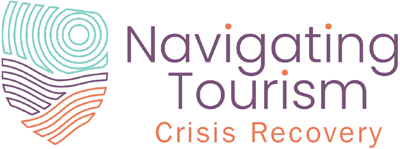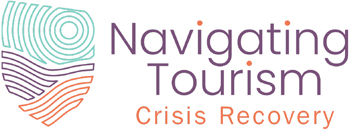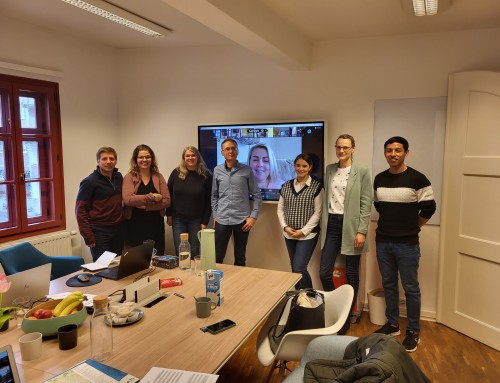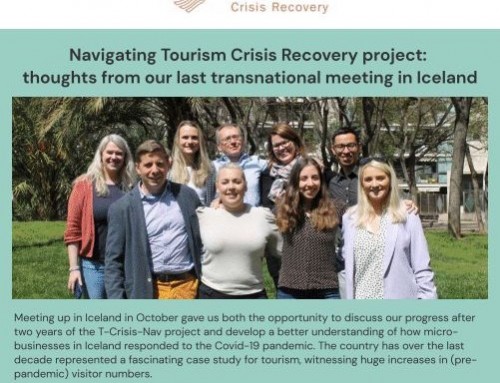Tourism Recovery introduction
The consequences of the Covid-19 virus for the tourism industry in the EU cannot at present be accurately assessed – but it is clear, that they will be devastating. The tourism sector is especially vulnerable to crisis (Hall/Williams 2019). The Tourism Recovery project will enable Higher Education institutes to educate existing SMEs and future entrepreneurs in the tourism sector to gain the skills and tools needed to successfully navigate their business through a virulent crisis. They will be fully equipped with the knowledge and actionable tools to analyse the specific extent of crisis impact and develop suitable countermeasures and navigate their company safely through the crisis.
A topic that has never been as important as now – especially with COVID-19 but also Brexit threatening this significant industry in an unparalleled scale. In order to achieve a sustainable effect, we focus not only on Higher Education institutes but also on SMEs and Vocational Education and Training tourism networks and the areas that educate and train future managers, employees and entrepreneurs in the tourism sector.
As the tourism industry is characterised by an above-average proportion of SMEs, and as these are at the same time particularly vulnerable but also innovative, our work has an effect not only in terms of securing jobs but also on the innovative strength of the entire industry. This is especially true regarding sustainable tourism approaches. Experts cannot accurately estimate the impact of the current crisis on tourism. What is clear, however, is that the extent will be exorbitant. Transport, hospitality, entertainment and related sectors such as taxi drivers will feel the effects for months, if not years, and hundreds of thousands, if not millions of jobs throughout Europe will be threatened.
The following statistics illustrate the importance of the sector for the European economy and show what effects the current crisis can have:
• in 2018, the sector contributed €782 billion and 14.4 million jobs in Europe
• Every year, EU residents take more than a billion vacation trips
• 35% of the world’s global tourism expenditure is generated from the EU
• Europe accounts for 50% of the world’s tourist arrivals and 37% of global tourism
All these figures are currently just a not-so-distant memory and will only recover slowly in the mid to long term – resulting in a constant threat to the predominantly small and medium-sized companies in the sector. While on the one hand short-term support measures are necessary from the political side, current and future entrepreneurs, start-ups and employees in the sector urgently need to be trained in strategic and operational crisis management, adaptive leadership and crisis resilience.
Based on our daily experience and many projects with HEI, VET, consultants and support infrastructures, we are realising a great demand for this topic area. Therefore, we build on our existing knowledge with regard to crisis management, turnaround, curricula development and innovative learning content design and fill existing research GAPs with regard to crisis management and needs of SMEs in the tourism sector. Building on this, we will develop an up to date HEI curricula, an actionable VET-Training package, a set of open educational resources addressing SMEs and StartUps and an innovative learning app: all helping to put existing and future owner/managers in tourism SMEs to gain the knowledge and management competencies to navigate their company through the virulent crisis and to become more crises resilient in the future.
Specifically, we will:
- Identify the challenges and needs of tourism SMEs in crisis
- Develop innovative curricula and learning frameworks for HEI and VET in order to train future generations of tourism executives, SMEs and StartUps and equip existing SMEs with the tools, competencies and frameworks to navigate their companies through a virulent crisis
- Develop an innovative learning APP and knowledge platform to ensure wide and free access, of all produced resources
In doing so, the project addresses the following needs of our target groups and will create sustainable impact for them:
- SME Owners/managers and future entrepreneurs develop the necessary crisis management and adaptive leadership competencies and are enabled to take appropriate countermeasures
- HEI and VET organisations, trainers, management consultants and support structures such as chambers or incubators are put in a position to sustainably professionalise their services and increase their impact
- By enabling companies to safely navigate through the crisis. we make a sustainable contribution to securing jobs at regional level. Against the background of networked value chains, this strengthens the resilience of the EU tourism sector





